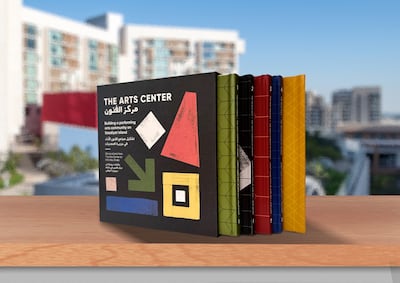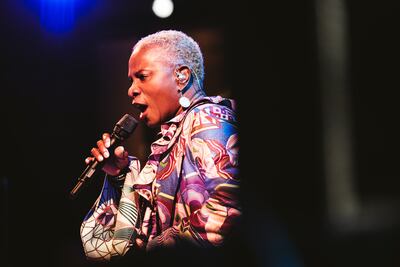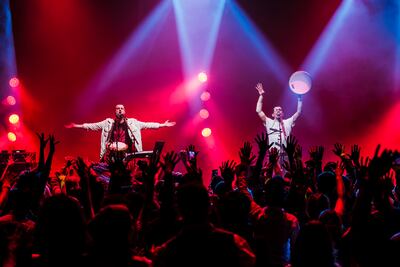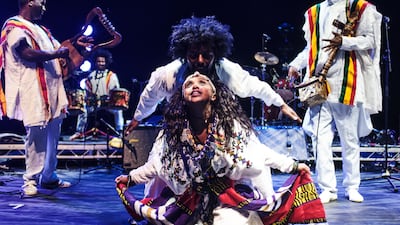When it comes to NYU Abu Dhabi Arts Centre, I have found that all roads lead to Morocco.
The world music festival Mawazine, held in the country’s capital, Rabat, is where I first engage with many of the artists making their way to the UAE to perform at the Arts Centre.
I’ve attended Mawazine for more than a decade, and it often takes place in May and June, a few months before the Arts Centre’s new season launches.
When I do meet the acts, whether it’s over sweet tea with Beninese singer Angelique Kidjo after a killer concert or a light pre-gig lunch with Afrobeat star Seun Kuti, the artists often quiz me on what to expect from their upcoming Abu Dhabi show.
“It’s a full programme,” I explained to Kidjo in 2017.
“The Arts Centre is not just about the show. There’s a great communal dinner and you’ll meet the students. It’s a whole package.”
Kidjo nodded in approval and Kuti was psyched. “Bring on the students!” he said with a cackling laugh.

I reminded him of that remark months later in March 2019, moments before we began our preconcert talk on NYU Abu Dhabi’s campus.
“This is really great, man,” Kuti whispered.
“Don’t tell me what you are going to ask. Let’s just get up there, talk and flow.”
We launched into an expansive conversation spanning everything from music and books to politics.
Kuti recalled the pressure of taking over Egypt 80 – the band formed by his late father Afrobeat pioneer Fela Kuti – his creative process and the enduring power of protest music. In short, he gave me the good stuff.
This is exactly what I signed up for when becoming a music journalist – the opportunity to sit with talented artists and understand the world through their eyes. Needless to say, Kuti’s performance the following night was pure fire.
He was a marauding presence on stage, wielding the saxophone like a hammer. Egypt 80 were right behind him and couched Kuti’s surging riffs with a thunderous polyrhythmic groove.
As for Kidjo, her 2018 live recreation of the classic Talking Heads album Remain in Light is still discussed in reverential tones by friends in the audience.
It was a performance as graceful as it was fiery. Backed by a cracking band and horn section (members of Antibalas), Kidjo transformed the claustrophobic feel and dense structures of the original album into summery grooves, all the while keeping some of the mystery and detachment central to the Talking Heads.
This is the magic of the Arts Centre, which recently announced a new batch of music performances including UK’s Asian Dub Foundation on September 23 and Brazilian Bossa Nova singer Bebel Gilberto on September 30.
Don’t expect these artists to treat this as any other gig.
Instead of just flying in and out before heading off to the next show, they also engage with the city through visits of cultural landmarks, meet NYUAD students and attend community dinners hosted by the Arts Centre.
These meals are not standard sit-down, networking affairs.
They are freewheeling, soulful and kooky discussions where walls are broken between artists, fans, organisers and even us journalists.
Often led by Arts Centre executive artistic director, Bill Bragin, a musician himself, these sessions offer a deeper and contextualised understanding of the performers and their body of work.
Getting Abu Dhabi back in tune

While the Arts Centre’s cultural impact is undeniable, it’s important to state that its effect is not so much game-changing as it is placing the UAE, and in particular Abu Dhabi, back in the concert game.
To understand this, let’s take a look back, albeit briefly, at the UAE’s music landscape before the arrival of the Arts Centre launched in 2015.
After the World of Music, Arts and Dance festival ended its Abu Dhabi edition in 2011, a growing number of eclectic music events – including the vibrant outdoor Ethiopian music parties on Abu Dhabi’s Corniche featuring then little-known legends such as the Ethio-jazz maestro Mulatu Astatke, who had an early 1990s residency at the Sheraton Abu Dhabi – slowly started being replaced with commercially driven events.
Concerts featuring diverse acts made way for middle-of-the-road entertainment, including nostalgia shows of 90s pop performers like Ace of Base and La Bouche and Greatest Hits concerts by Elton John and Eric Clapton.
While the shows were technically fine, that sense of cultural exploration defining the city was slowly diminishing.
The Abu Dhabi I grew up in, where I would see flamenco performances at the InterContinental hotel with my Spanish uncle-in-law in the late 1980s and an all-star line-up of Eritrean crooners in a packed hall as a child near Al Nahyan Stadium, was slowly becoming a thing of the past.
The Arts Centre’s arrival in 2015 reinvigorated the UAE’s live performance scene with its state-of-the-art theatre, production crews and a dynamic performance programme that included music and dance.
This was particularly felt since ballets and flamenco concerts were often sporadic affairs held by the annual Abu Dhabi Festival.
Dubai Opera, which would go on to host the lion’s share of dance shows, opened a year later.
The Barzakh Festival Effect

This resurgence of performance was monumentally realised by the inaugural Barzakh Festival in 2017, an absolutely joyous two-day celebration of global sounds featuring everything from the Gnawa beats of Morocco's Aziz Sahmaoui and Noura Mint Seymali's Mauritanian-Moorish desert blues to the turbocharged Ukrainian folk punk of DakhaBrakha.
The impact was immediate because the intention was genuine.
The festival was not an attempt to teach, preach or dictate trends, but was designed to extend an open hand to a cultured community increasingly wearied by suspect past offerings.
Perhaps Bragin knew this. In one of his first interviews with The National in 2015, he clearly stated his vision at the Arts Centre.
“The idea is to create more connectivity to being here in Abu Dhabi. When I look at my work as a curator, it is not purely on an aesthetic level. The artwork itself is central but it is not the only thing,” he said.
“Providing a shared artistic experience helps bring people together … The Arts Centre will hopefully be the way they can find one another, discover their tribe and those with similar interests they never knew were here.”
Barzakh Festival is now a key feature of the cultural calendar and will return to The Red Theatre on March 1 and 2 with the full line up to be announced soon.
The annual line-ups are not composed of acts who happen to be touring the region; they are specifically chosen as a way of blending the traditional with modern, for work that is loyal to its roots while fearlessly looking outward.
They include the Sudanese funk stylings of Alsarah & The Nubatones, and Dengue Fever’s psychedelic take on Cambodian pop.
Before making their UAE debut at Barzakh Festival in 2018, percussionist and singer Walaa Sbeit from Palestinian group 47Soul told The National that the group was curious to see how their heady synthesis of electro-fuelled Levant folk would be received.
Any plans to “bring the crowd with us” was jettisoned within minutes on stage. Such was the reaction from a sold-out audience that 47Soul had to dial up the energy to keep up.
The result was a high octane show that nearly resulted in The Red Theatre’s first-ever mosh pit. Arms – and hair – were flailing while small groups did their best to crush the hall’s floor with muscular dabke moves.
Homecoming
It was the same deal with Ethiopian group Fendika.
While they rehearsed, the UAE Ethiopian community rallied, many of whom learnt about the event through their social media and church groups.
The audiences at their 2019 performance felt the jubilant air of a homecoming. It was a particularly moving spectacle.
Seeing a joyous, multicultural crowd revelling in Fendika’s electrifying Amharic numbers, performed by a live band, brought back memories of those Corniche shows and the vibrant Abu Dhabi music scene I feared were gradually being lost forever.
And if there are any other musicians yet to receive this memo, I am more than happy to give you a pre-gig briefing wherever we meet on the road.
This is an edited version of the essay “The Red Theatre” by Saeed Saeed, published in commemorative book The Arts Centre – Building a Performing Arts Community on Saadiyat Island and available at Magrudy’s in NYU Abu Dhabi and Amazon


